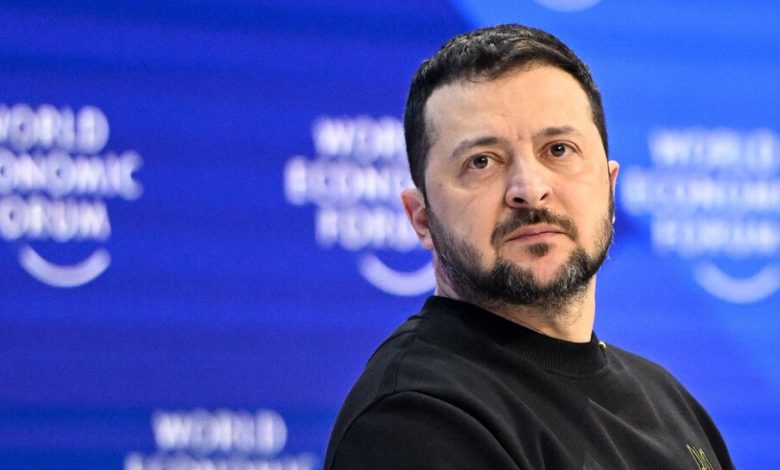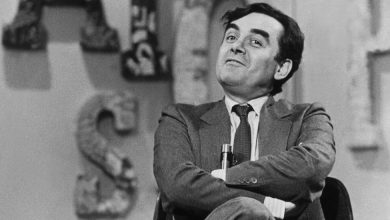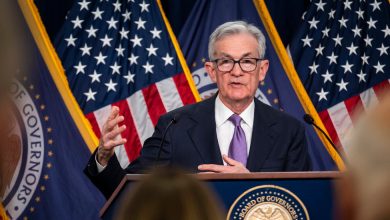The Zelensky-Trump Divide at Davos


Volodymyr Zelensky, Ukraine’s president, tried to tamp down worries about Donald Trump, and whether his potential re-election would lead to a drop in support for his country.Credit…Radek Pietruszka/EPA, via Shutterstock
Zelensky and Trump loom over Davos
Two people are having an outsize impact at the World Economic Forum, and one of them isn’t even there.
One is Volodymyr Zelensky, Ukraine’s president, who put on a full-court press of business and global leaders at the forum in Davos, Switzerland. The other is Donald Trump, whose potential re-election is dominating the discussion among attendees.
Zelensky used an expletive to describe a Trump claim about containing Vladimir Putin. At a Q. and A. with journalists that Andrew moderated, Zelensky dismissed the idea that Trump could stop the Russian president from going after other parts of Europe. Putin, he added, “will not stop — but the question is what will the U.S. and Trump do after this point, because in this case it will mean that Europe lost the most useful and most strong army in Europe because we lost Ukraine.”
Zelensky initially sought to tamp down worries about Trump, and whether his potential re-election would lead to a drop in support for Ukraine. But he also appeared somewhat fearful about the prospect. “One man cannot change the whole nation,” Zelensky said in the Q. and A., adding that deciding on the next president is “a choice for the American nation and only the American nation.”
The Ukrainian leader acknowledged that a win for Trump, who has opposed U.S. aid to Ukraine, could affect his country’s military campaign or settlement talks. “Radical voices from the Republican Party” have created tension and pain for the Ukrainian people, he said.
Zelensky isn’t the only leader at Davos worried about Trump. Multiple attendees have told DealBook that the outcome of the election is a potential risk for business, particularly after the former president thumped his Republican rivals in the Iowa caucuses.
The Ukrainian leader has sought to shore up global business support. He spoke at a private gathering of executives organized by JPMorgan Chase, which is advising Ukraine on its reconstruction efforts.
In the audience at the Congress Center for the talk were Steve Schwarzman of Blackstone, Ray Dalio of Bridgewater, David Rubenstein of Carlyle and Michael Dell of Dell, DealBook hears.
Zelensky also spoke about how U.S.-China tensions are affecting Ukraine. Bringing Beijing on board with the country’s reconstruction is important, given China’s size and influence on Russia, he told the C.E.O.s. But Ukraine is seen as an American concern, not a global one.
-
Seen and heard around town: The traffic on the main street was so bad that John Kerry, President Biden’s climate envoy, hoofed it to a meeting. And the annual wine tasting hosted by Anthony Scaramucci, the financier and former Trump official, well, ran out of wine.
HERE’S WHAT’S HAPPENING
Rate-cut concerns rattle the markets. European stocks and bonds are down this morning, after Christine Lagarde, the European Central Bank president, warned that interest rates may not fall until the summer, and inflation in Britain rose unexpectedly. U.S. futures are also down after Christopher Waller, a Fed governor, signaled yesterday that it was premature to consider a rate cut in the first quarter.
Disney formally rejected Nelson Peltz’s board nominees. The entertainment giant has submitted a slate of directors — including James Gorman of Morgan Stanley and Mary Barra of General Motors — and snubbed the activist investor, who has criticized Disney over strategy and succession planning. Separately, compensation for Bob Iger, Disney’s C.E.O., for fiscal 2023 topped $31 million.
BP appoints a new C.E.O. The energy giant today named as its new chief Murray Auchincloss. The former C.F.O. stepped in as interim chief four months ago after his predecessor, Bernard Looney resigned for failingto disclose relationships with employees. Auchincloss has indicated that he will follow Looney’s strategy to build up the company’s renewables business and cut back its oil and gas production by the end of the decade.
China’s conundrum
China delivered a double dose of bad news this morning, pushing down markets in Asia. Official data shows that the economy grew last year at its slowest pace in decades and that the country’s population declined again.
The readings are another sign of deeper problems in the world’s second-largest economy, as it grapples with a property crisis, weak consumer confidence, falling exports, deflationary pressures and big demographic challenges.
The economy grew 5.2 percent last year, up from 3 percent in 2022 when strict coronavirus restrictions were in place. That was better than the official target of about 5 percent but 2024 is expected to be tougher, with a Reuters poll of analysts forecasting growth that will probably slow to 4.6 percent.
The population decline points to bigger challenges. The country recorded more deaths than births for a second straight year. Beijing is worried because fewer people means fewer consumers, and it needs working-age people to fuel growth. Retail sales in December were lower than expectations, too, while industrial output barely surpassed them.
A post-Covid boost hasn’t materialized. “Chinese authorities and some international economists believed that China’s economic downturn in the past few years was caused by the “zero Covid” policy,” Yi Fuxian, a scientist at the University of Wisconsin–Madison and an expert on Chinese demographics, told DealBook. “But China’s economic recovery was much weaker than expected last year, as the core drivers of the downturn were aging and a declining work force.”
Structural reforms are needed to address these new realities. But for the short term, China will continue to rely on export-led growth at a time when many Western companies are already looking to move parts of their supply chains elsewhere.
An airline deal hits turbulence
The Biden administration scored a major victory yesterday after a federal judge struck down JetBlue’s proposed $3.8 billion acquisition of Spirit Airlines, a low-cost rival, ruling that the merger would harm competition.
The decision blocks the airline sector’s biggest attempted tie-up in the U.S. in over a decade, and throws into question the industry’s efforts to consolidate. President Biden hailed the ruling as “a victory for consumers everywhere who want lower prices and more choices.”
The Biden administration says airline mergers have made travel more costly. Last year, the Justice Department won a lawsuit that forced JetBlue and American Airlines to end a regional code-sharing alliance.
We are having trouble retrieving the article content.
Please enable JavaScript in your browser settings.
Thank you for your patience while we verify access. If you are in Reader mode please exit and log into your Times account, or subscribe for all of The Times.
Thank you for your patience while we verify access.
Already a subscriber? Log in.
Want all of The Times? Subscribe.




